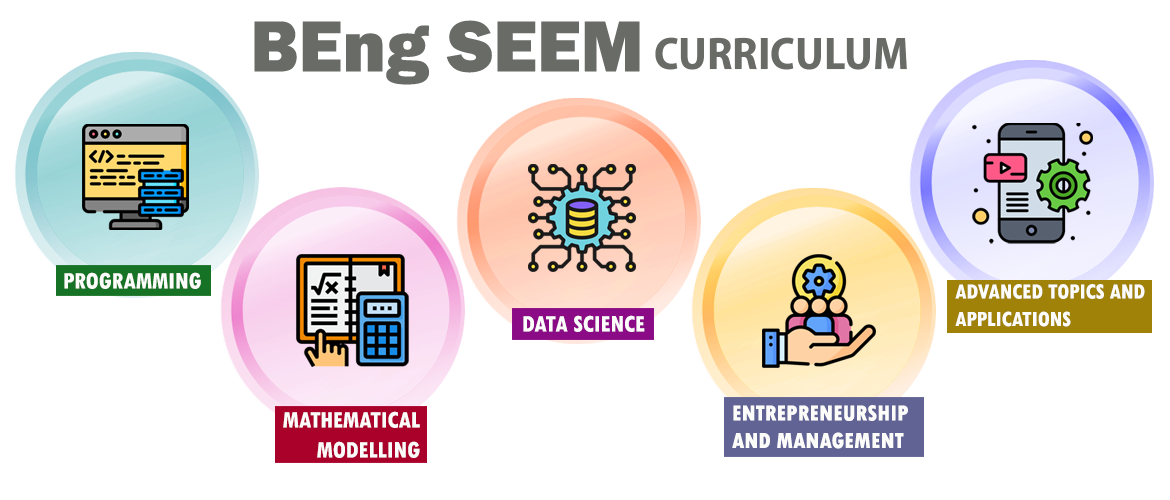CURRICULUM
The curriculum of the SEEM program is designed to provide students with solid and comprehensive training in programming, mathematical modelling, entrepreneurship and management, data science, and various applications. The training is supported by an extensive list of high-quality courses, including not only courses in SEEM but also some courses in computer science and in financial technology.
本科為計算機編程課程,為學生提供解決工程問題的軟件知識和技能。學生將學習C語言中的基本編程概念,例如數據表示和變量,運算符和表達式,流程控制語句,函式,數組,結構,指針基礎知識,輸入/輸出處理等。除了講課和線上學習,學生將在計算實驗室實習解決問題,並完成一工程軟件項目。此科將涵蓋各種問題解決方法,如增量開發,分而治之,調試技術,有限狀態機等。通過實踐,學生將獲得多種技能,包括:議題及草擬規格、進行建模和模擬、開發軟件系統原型、進行核實、驗證和性能分析。
This course introduces the computer-oriented problem-solving methods and algorithm development; object oriented programming concepts; concepts of abstract data types; simple data structures; illustrative applications. The C++ programming language will be used.
本科介紹面向計算機的問題求解方法及算法開發;面向對象程序設計概念;抽象數據類型概念;簡單數據結構;應用示例。本科使用高級程序設計語言”C++”講授。
CSCI1130/ ESTR1102 Introduction to Computing Using Java 計算導論(JAVA語言)
This course aims at providing students with the basic knowledge of computer programming. In particular, programming methodologies such as object-oriented programming and structured programming, and the use of abstract data types will be illustrated using high-level programming languages such as Java.
本科旨在向學生提供計算機程序設計之基礎知識,並以高級程序設計語言(如Java)講解包括面向對象程序設計和結構程序設計等之程序設計方法學及抽象數據類型之運用。
本科旨在向學生提供計算機程序設計之基礎知識,並以高級程序設計語言(如Java)講解包括面向對象程序設計和結構程序設計等之程序設計方法學及抽象數據類型之運用。
本科旨在密集介紹高階程序設計語言 Python 。內容包括基本高階程序設計語言Python 的語法、變數申明、基本運算符、程序編寫流程及控制、函數定義及應用、文件及操作系統接口。本科亦會介紹高階程序設計語言 Python 的特性,例如面向對象支援方法、函數式編程、lambda函數、列表解析、高階動態資料型式,嵌入於應用程式、創建模塊等。特別專題包括使用Python在網絡/數據訪問,動畫,以及使用Python開發網絡爬蟲。 參考意見: 選科者須具備編程的知識。
本科介紹抽象數據類型之概念及數據抽象化的優點。並討論多種常用的抽象數據類型,包括向量、表格、堆棧、隊列、樹形;集(合)和利用不同的數據結構(例如:陣列、指示字為基的結構、連接表、2-3 樹形、B 樹形等)作出的實踐。更以實例(例如:檢索、排序等)來說明數據抽象化在計算機程序設計上的應用。並討論檢索與排序算法及數據結構之應用。
目前,網頁編程規範變得越來越重要,而安全性則是網頁編程規範的核心。在本科中,學生將使用 HTML, CSS, Javascript, PHP 等編程語言,以及 SQL 數據庫技術,開發一個具有良好用戶介面和用戶體驗的交互式網站。學生還將瞭解主要的網頁攻擊方式,以及如何在網頁編程中避免這些攻擊。本科還將設置課程大作業幫助學生加深對本科內容的理解。
本科教授線性代數的基本概念與方法,以及其在工程上的應用。內容包括:線性方程組、高斯消去法、矩陣分解、矩陣及其運算、行列式、特徵值及特徵向量、對角化、向量空間、格拉姆–施密特正交化和線性變換。
本科教授多元微積分的基本概念與方法,以及其在工程上的應用。內容包括:多元函數、曲線與曲面、偏導數、泰勒公式、拉格朗日乘子法、多重積分、曲線與曲面積分、格林定理、斯托克定理和散度定理。
本科專為工程學院學生而設。簡介微積分技巧及其在工程中的應用。本科強調計算技巧,而非嚴格理論。學生要具備等同於香港中學文憑考試數學延伸部分單元一或二之數學基礎。
集(合)論、函數、關係(式)、組合學、圖論、代數系(統)、命題及謂詞邏輯。
本科教授概率論基礎及其在不同工程領域上的應用。內容包括:樣本空間與隨機事件、計數法則、概率公理、條件概率、獨立事件、離散與連續分佈、隨機變量、聯合分佈和極限定理。
本科教授統計學基礎及其在不同工程領域上的應用。內容包括:母群及樣本、點估計、區間估計、假設檢驗和線性回歸的基本概念。
線性代數之回顧。線性規劃:單純形法,對偶及敏感分析。網絡規劃:運輸問題和分派問題,最短路線,最小支撐樹及網絡單純形法,多類商品網絡模型。線性規劃模型之應用。
非線性規劃:凸集及函數;局部及整體最優;Lagrange 乘子;約束問題的最優性條件;下降方法;有約束最優化;Karush-Kuhn-Tucker 條件;解法。不可微最優化:整規劃模型;問題的歸結;切割平面法;分枝定界。動態規劃:模型及歸約, Bellman 方程;解決方法。
系統概念和數學模型。模型之建立:參數估計和數據分析。基本排隊模型的理論及應用:M/M/S 模型。模擬和模擬語言簡介。離散事件系統模擬原則。隨機數產生器及輸出分析。模擬優化。在生產製造系統中的應用。
工程經濟學主要原理。價值及成本;資金流動;方案技術、社會和人力因素等問題的經濟分析。有關資源分配和調度之模型。評估工業項目之分析技術。技術經濟性和工業生產力之間的關係。基本財政會計概念;會計週期;財政報告。
延續產品創新之動機要素。創新、評核及尋求產品機會之過程研究。新產品概念之評審及商品化之風險評估。工業市場的產品開發策略。買方行為探討。創新市場策略之釐訂及實施和商業計劃。
本科目標是讓學生對工程專業的實際工作有基本的認識。學生選修本科前,必須先完成不少於八星期全職、獲工程學院認可的實習工作。 為取得本科學分,學生需要在修讀本科的學期內提交僱主評語和實習報告,說明實習內容及所學知識,負責本科的教授會根據報告和僱主評語的文本來決定學生是否及格。 學生可以在工程學院創新科技中心管理的「實習與就業」網頁尋找實習工作,其他途逕覓得實習機會亦可以考慮。學生宜在報讀本科前詢問老師對有關實習工作的意見。 工程學院主辦為期十二個月的「工讀計劃」,是符合本科要求的實習計劃。 參考意見: 只供工程學院主修生於第二修業學年或以上修讀 。(新學制)
這科提供基礎藍圖幫助學習數據科學化,這是嶄新及急速發展的領域,目的是學習利用科學化的方法及分析大量數據來輔助解決實用問題,訓練學生具備相關的思維。 數據科學化牽涉各學科包括數學、統計、電子計算、數據挖掘、系統科學及數據視覺化。 它可應用於各領域,透過處理及分析數據來支持科學探索與發現。這科也可增加學生對相關學科的認識,幫助他們日後修讀更深入的科目,擁有數據科學化的專業技術。 科目範圍包括: 數據科學化的歷史及影響,數據採集: 來源、種類、範疇,數據視覺化: 數據顯示、數據字典,數據架構與圖像化,數據分析:模式識別、相關性、關聯性,假設檢驗、統計顯著性測試,數據研究:數據挖掘、機器學習、推理,元數據設計,數據模型,含義抽取及驗證,實用個案及應用。
該科從統計和概率的角度介紹決策與數據分析,內容包括線性回歸,分類,抽樣,模型選擇,決策樹,主成分分析,聚類,以及其在決策分析中的應用。
毫無疑問,金融數據非常豐富。特別是近年來,各類網站資源(比如彭博、路透)提供的股票價格等金融數據愈來愈快捷。本科旨在學習實證分析方法在金融工程中的應用,如何運用概率統計推斷方法對數據進行有效分析。特別是本科要回答如下統計意義下的問題:各類金融市場的數據模型,模型的參數估計,模型的簡化和模型的精確化等。本科的主要目的就是要理解與認識股票以及其它金融資產的價格的變動。
本科介紹隨機過程的基本理論以及其在決策分析中的應用,具體內容包括馬氏鏈,馬氏決策過程,以及多種近似動態規劃的方法。
定量行為分析是一門通過定量方法刻劃顧客行為的新興學科。 本課程將重點講述(i)如何使用優化技術來設計調查問卷並收集與顧客行為的相關數據,(ii)建立顧客的行為理論,特別是他們面臨風險選擇下的行為, (iii)如何使用數據挖掘技術來刻劃顧客行為,以及(iv)顧客行為中顯現的心理偏差及其對金融和商業決策的影響。
這科提供基礎藍圖幫助學習數據科學化,這是嶄新及急速發展的領域,目的是學習利用科學化的方法及分析大量數據來輔助解決實用問題,訓練學生具備相關的思維。 數據科學化牽涉各學科包括數學、統計、電子計算、數據挖掘、系統科學及數據視覺化。 它可應用於各領域,透過處理及分析數據來支持科學探索與發現。這科也可增加學生對相關學科的認識,幫助他們日後修讀更深入的科目,擁有數據科學化的專業技術。 科目範圍包括: 數據科學化的歷史及影響,數據採集: 來源、種類、範疇,數據視覺化: 數據顯示、數據字典,數據架構與圖像化,數據分析:模式識別、相關性、關聯性,假設檢驗、統計顯著性測試,數據研究:數據挖掘、機器學習、推理,元數據設計,數據模型,含義抽取及驗證,實用個案及應用。
訊息系統的基本要素、其概念及相互關係。數據庫系統:數據庫模型、關係數據基本概念、數據庫應用編程。訊息檢索系統:訊息檢索模型、索引構造、性能評估。專家系統:知識與數據工程、專家系統外殼、應用實例。
資訊系統發展週期;用戶需求分析;可行性分析;成本 / 效益分析;系統分析工具如數據流程圖及過程說明工具。實時系統分析。由分析到設計之變換。結構圖表。評估系統設計質素之啟發方法:連接及聚合。系統設計之組裝及優化:CASE(計算機輔助軟件工程)工具。
深入討論在現今激烈競爭下的資訊管理的挑戰、方法和技術。聯繫資訊管理和商業競爭策略以及再工程。資訊系統:DSS , MIS , TPS 。資訊系統的計劃,研究過程及管理。資訊系統的預算及分佈。效績評估和審核。運作管理。私隱權利和保安
操作系統原理。匯編程序、連接程序、裝入程序、記憶管理及進程管理之介紹。UNIX 之應用。雲計算的概念及基於應用需要之評價與選擇。
系統的執行方法、構成、測試及維護。軟件的重覆工程及反向工程;軟件的可靠性及程序品質的保證;軟件的再用性。軟件的量度制。系統功能的工程方法。結構管理。目標面向系統設計。計算機輔助工具使用。
開放系統技術及機制的概述。互聯網的高層次應用:包括電子商務的開放系統及 Web 技術。開放系統上的多媒體應用。無線及移動網絡的應用。
本科介紹應用在電子商務的數據採集技術和分析。範圍包括推測法、關係常規搜集、常規推斷、趨勢及偏離分析、規律可視化及數據採集工具。本科集中討論應用上述技術在市場學、風險管理、商業談判及各商業上的問題。
本課程介紹了有關金融數據分析的基本概念、模型、技術和應用。主要問題包括:數據流的處理與分析;高維數據的處理與查詢;大規模圖數據分析;網絡挖掘;面向網絡應用的推薦系統。相關應用包括:金融數據處理與分析,時間序列、組合資產管理,社交網絡,推薦系統等。
人機互動設計的基礎,包括人類處理信息的模型及其理論、智能介面的設計方法、步驟及評估之方法。人機互動的要素:佈局、顯示、規約、對話、程序及誤差的處理。應用於人機互動的新科技:語音識別、觸感合成、虛擬真實、軟件代理、群體軟件等。
這科目的是向學生介紹業界最新資訊科學技術,如雲端運算、社交媒體技術、移動計算等,並教授如何將科技應用在商業社會中,解決日常生活的問題。向學生介紹案例研究,以說明如何在解決現實問題的過程中使用先進技術。 學生將有機會採用設計思維技巧,提出解決問題的創新思路,並可選擇創建他們設計的試驗性實施。本學系亦會邀請業界領導和專家作經驗分享。
在高速線上支付中,為支持數以百萬計的帳戶間交易,效率與可靠性是兩個重要的因素。本課程介紹了關於數據庫系統的高級主題,包括:查詢處理及優化,事務管理,併發控制,恢復系統,並行數據庫以及分佈式數據庫。
本科介紹了加密貨幣、區塊鏈、分布式分類帳技術及其應用。學生會學習這些系統如何工作,以及如何開發軟件應用程序和比特幣網絡及其他加密貨幣的交互。
證券、外匯、期權與期貨市場的概況,理解市場的特徵為本科的重點,從財務報告中了解機構的流動性、償債力、盈利力、效率及增長。
利率論的基礎,固定收益的證券,利率的年期結構,公司的估值,不確定環境下的決策,均值方差組合理論,資本財產定價模型,模型及數據,遠期及期貨合約的基礎,期權的基本理論。
金融工程的市場,信貸,與操作風險的分析及建模。基本金融工具與衍生商品:遠期,期貨,期權,及交換。市場風險的主要來源以及評估模型:利率,匯率,證券,及期貨價格的波動。主要評級以及信貸風險分析模型:Z-score , Logit 及 Merton 。商業系統如 KMV 和 CreditMetrics 。不同的在險值計算方法,包括:歷史、參數及 Monte Carlo 。
數值方法及其在金融和風險管理的應用:線性及非線性方程式的求解、局限及不局限下的優化,蒙地卡羅模擬法,偏微積分方程中的有限差分。其他相關的金融應用。
毫無疑問,金融數據非常豐富。特別是近年來,各類網站資源(比如彭博、路透)提供的股票價格等金融數據愈來愈快捷。本科旨在學習實證分析方法在金融工程中的應用,如何運用概率統計推斷方法對數據進行有效分析。特別是本科要回答如下統計意義下的問題:各類金融市場的數據模型,模型的參數估計,模型的簡化和模型的精確化等。本科的主要目的就是要理解與認識股票以及其它金融資產的價格的變動。
定量行為分析是一門通過定量方法刻劃顧客行為的新興學科。 本課程將重點講述(i)如何使用優化技術來設計調查問卷並收集與顧客行為的相關數據,(ii)建立顧客的行為理論,特別是他們面臨風險選擇下的行為, (iii)如何使用數據挖掘技術來刻劃顧客行為,以及(iv)顧客行為中顯現的心理偏差及其對金融和商業決策的影響。
本課程介紹了有關金融數據分析的基本概念、模型、技術和應用。主要問題包括:數據流的處理與分析;高維數據的處理與查詢;大規模圖數據分析;網絡挖掘;面向網絡應用的推薦系統。相關應用包括:金融數據處理與分析,時間序列、組合資產管理,社交網絡,推薦系統等。
本科旨在研究市場管理之功能,分析環球和宏觀市場因素,在推動及控制市場策略時的互維關係。其目的在培育學生明白及掌握基本市場學理論、發展和營銷商品概念,探討如何因應市場不同的環境,作出評估及選擇適當的市場策略,為企業和社會創造雙嬴的結果,並發展學生的思維及分析才能,發掘市場機會及制訂可行的市場方案。
物流與供應鏈管理涉及如何管理材料流通,信息流通等各種各樣的在鏈條裡的流通。這些流通在物流與供應鏈裡廣泛存在,從原材料供應一直到終端顧客的各個相關方之間都極大地影響著整個系統之表現。本科著眼於為能進行有效管理物流與供應鏈而必須掌握的基本概念,模型,以及技術。主題包括發現關鍵權衡,分析系統特性,理解各種策略(例如風險共擔,庫存控制,合作,以及信息共享等)的有效性。
品質管理、控制與改進。採樣理論。生產運行中的統計品質控制理論。生產系統之監控規範和控制圖表。品質工程 - Taguchi 方法。製造和服務行業中的品質控制問題。工業品質控制問題之有關個案分析。計算機輔助工具之使用。ISO 9000導論。
本科涵蓋了一系列物流與供應鏈管理的進階課題。具體而言,我們利用比較嚴謹的模型來描述一系列物流與供應鏈管理中的重要問題,並發掘其最優控制策略。主題包括顧客服務,分銷渠道,交通,車輛路徑規劃,並貨,設施選址及網絡規劃,存儲。本科同時也會介紹在物流與供應鏈業界中的重要實踐,例如原料處理系統,信息系統,採購及供應規劃,第三方物流,全球物流等等。
服務機構營運及操作的概要。檢視各種在保健、金融、旅遊、電訊及物流行業所使用的服務提供系統的設計和運作方法。探討下列課題─服務策略、個人及企業的服務、服務科技、程序及設施的設計、等候行列的管理、需求的預測、需求及供應的管理、服務的素質、人員配備及調度。
簡介運用於醫護、金融、保險、旅遊、電訊及零售各行業的服務系統。檢測服務系統作為產品或服務的特徵。分析、設計、營運系統的定性及定量方法。系統使用者的影響。系統開發的考慮。
As an optional choice, the program offers two streams of specialization. The stream of Business Information System focuses on the business information system aspect of data science and on applications in E-commence and technological innovation. The stream of Decision Analytics focuses on the decisions analytics aspect of data science and on applications in financial engineering, logistic and supply chain management, and service engineering and management.

STUDY SCHEMES
Programme Title: Systems Engineering and Engineering Management (SEEM)
Study Scheme Applicable to students admitted in 2023-24

PROGRAMME REQUIREMENT
For reference only. Students should refer to Student Handbook in case of any inconsistency or ambiguity.

Programme Details

INTERNSHIPS
In the past, our students interned in a variety of institutions.
- Commercial banks: e.g., HSBC Insurance (Asia) Limited, Hang Seng Bank Limited and The Hong Kong and Shanghai Banking Corporation Limited
- Technology companies: e.g., Robert Bosch Co. Ltd. and FonFair Technology Lmited
- Logistic: e.g., Kelly Services Hong Kong Limited
- Insurance: e.g., Generali Life (Hong Kong) Limited and Swiss Reinsurance Co. Ltd
- Consulting: e.g., Deloitte China
- Regulation: e.g., Hong Kong Monetary Authority
All students are welcome to join Placement and Internship Programme (PIP). PIP offers a direct communication channel between our students and their potential employers. PIP offers opportunities of internships, career talks, seminars, summer jobs and placement which are collectively managed under the Student Placement and Internship Programme (PIP).

OVERSEAS EXCHANGE
Our students have participated in exchanges at various places around the globe.
- Europe and Africa: e.g., Karlsruhe Institute of Technology, University College London, University of Bergen, The University of Liverpool, Technical University of Denmark, TELECOM SudParis, Katholieke Universiteit Leuven, University of Southampton, University of Economics, Prague
- Asia: e.g., Shanghai Jiao Tong University, Soka University, University of Seoul, Seoul National University, International Christian University
- Americas: e.g., University of Pennsylvania, Tecnologico de Monterrey, Rensselaer Polytechnic Institute, Dartmouth College, St. Edward’s University, University of Toronto

ACADEMIC HONESTY
Students are required to meet the highest standard of academic honesty. All students should learn and be aware of the following standards and guidelines:


